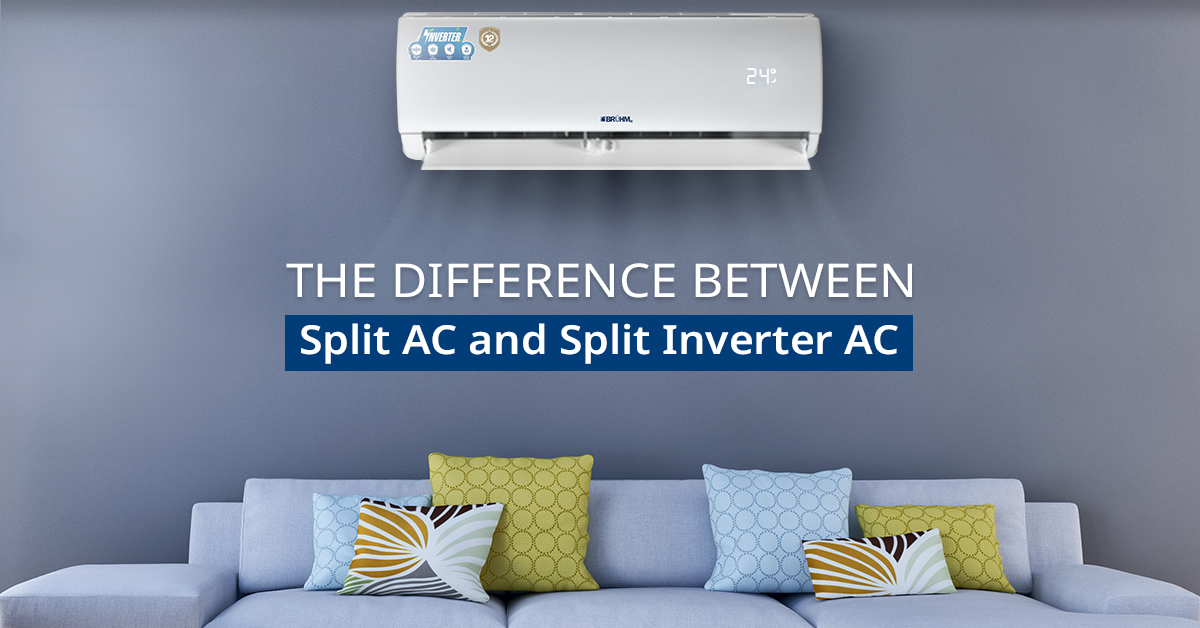- By Danish
- January 10, 2025
- Air Conditioning
The Difference Between Split AC and Split Inverter AC For Your Home and Offices

Modern air conditioning systems have transformed how we stay comfortable and relaxed at home and in offices, especially during warmer climates. Bruhm, a renowned name in home appliances across Africa, offers a range of air conditioners designed to suit different needs. This blog will explore the difference between split AC and split inverter AC, helping you choose the right air conditioner for your space.
Introduction to Air Conditioning Systems
Air conditioning systems provide relief from the heat, enhancing comfort and productivity. When it comes to choosing the right AC for your space efficiently and effectively, the battle between Split ACs and Inverter ACs takes the stage. Among the many types available, these two air conditioners stand out for their popularity and efficiency. Let’s delve into what makes these systems unique.
What is a Split AC?
A split AC is a common air conditioner consisting of two main components: an indoor unit that blows cool air and an outdoor unit that dissipates heat. It operates on a compressor system that switches on and off to maintain the desired temperature.
While reliable and effective, split ACs tend to consume more energy because the compressor runs at full capacity every time it restarts. This can also lead to a noticeable shift in room temperature.
What is Split Intervter AC?
A split inverter AC is an advanced version of the split AC. It uses inverter technology, which allows the compressor to operate at variable speeds. Instead of shutting down and restarting, the compressor adjusts its speed based on the cooling demand.
This technology results in smoother operation, greater energy efficiency, and a more consistent indoor climate.
Key Differences Between Split AC and Split Inverter AC
- Energy Efficiency
One of the most significant differences between split AC and split inverter AC is in energy consumption. A split AC compressor consumes more power because it frequently stops and starts. On the other hand, a split inverter AC optimizes energy use by maintaining a steady compressor speed, leading to lower electricity bills.
- Cooling Performance
Split inverter ACs provide faster and more consistent cooling. Their ability to adjust the compressor’s speed allows them to cool a room quicker than traditional split ACs while maintaining an even temperature.
- Noise Levels
Split inverter ACs are quieter than split ACs because the compressor operates smoothly without frequent stop-start cycles. This makes them an excellent choice for bedrooms and offices where noise can be a distraction.
Choosing the Right AC for Your Home
Factors to Consider
When choosing an ideal air conditioner, consider the size of your space, your budget, and how frequently you’ll use it. While split ACs are more affordable upfront, split inverter ACs offer long-term savings and improved performance, making them a worthwhile investment.
Conclusion
Understanding the difference between split AC and split inverter AC is important for making an informed decision. While both systems have their advantages, split inverter ACs stand out for their energy efficiency, consistent cooling, and quieter operation.
Bruhm offers high-quality air conditioning solutions tailored to meet the needs of African homes and offices. Choose wisely, and enjoy the perfect balance of comfort and savings!
